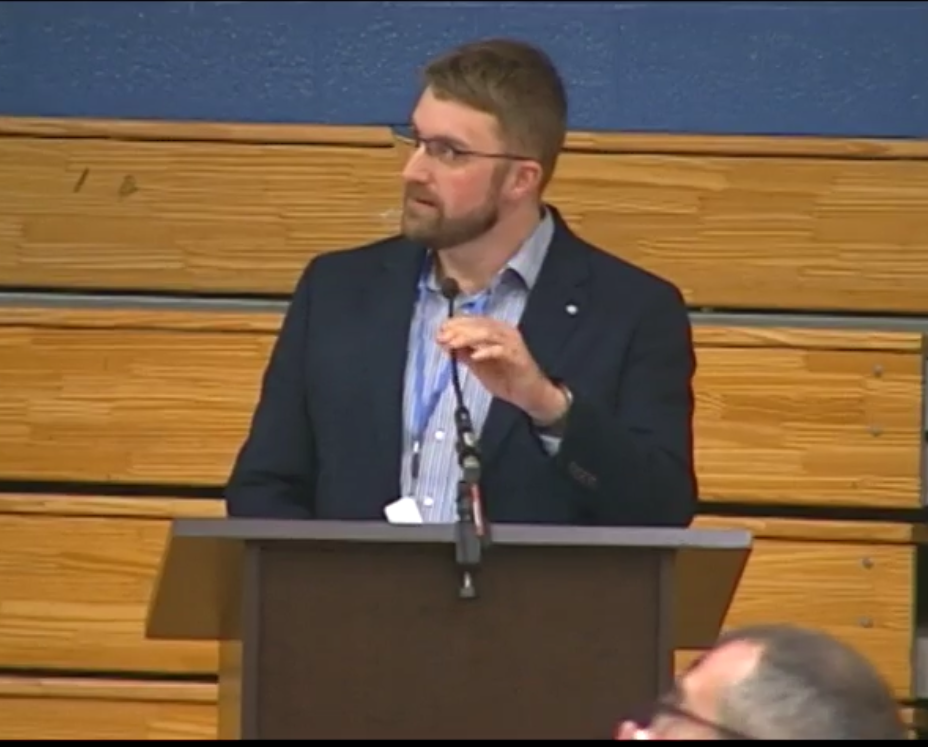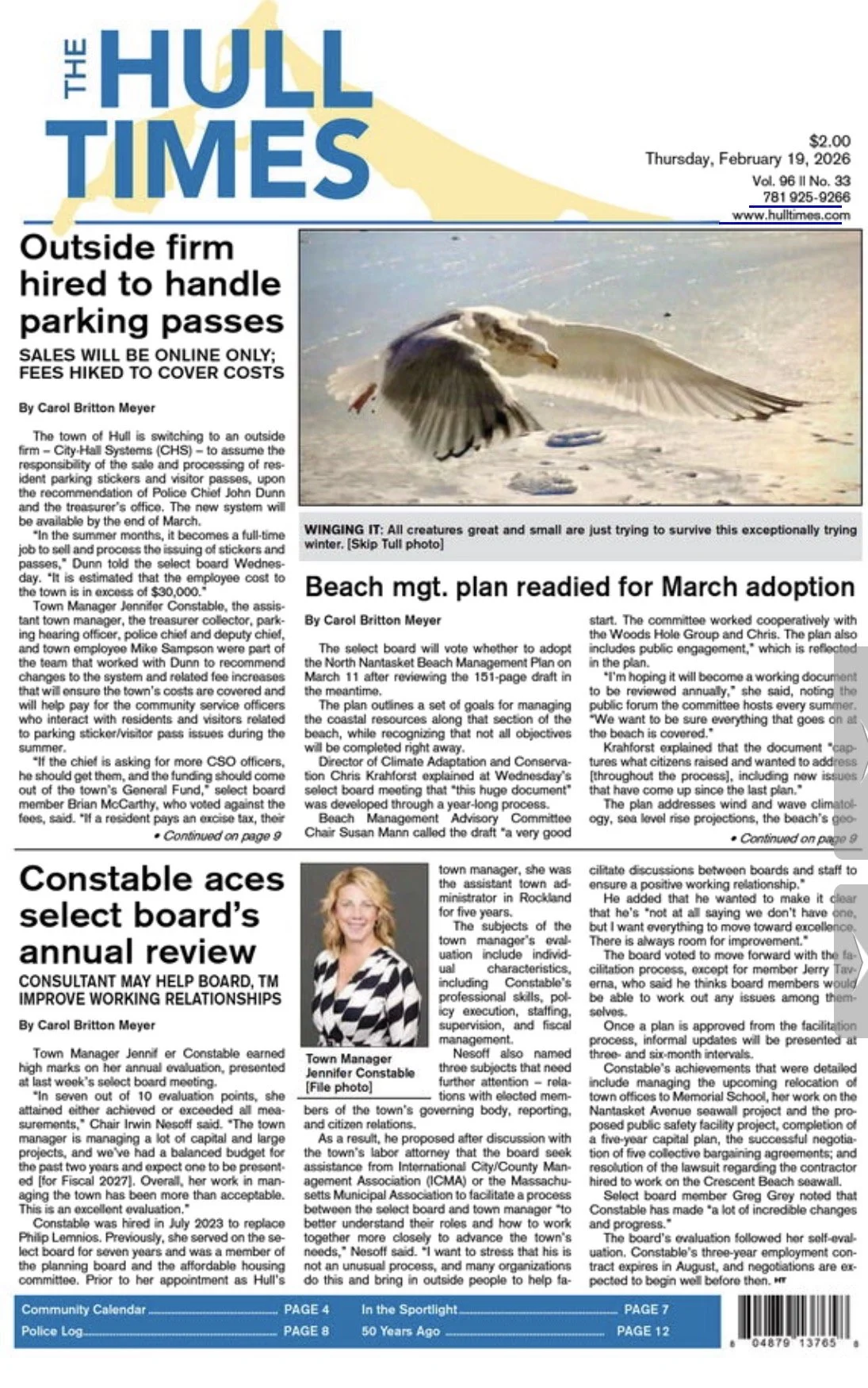Following lengthy discussion, town meeting removes town manager from light plant role
/By Carol Britton Meyer
The citizens’ petition seeking voter approval to remove the town manager from the Hull Municipal Light Plant manager role passed during session two of the annual town meeting on a 116 to 83 vote, following a complicated and sometimes confusing roughly two-hour discussion. The light board was divided on the issue.
Article 37 was one of nine warrant articles addressed on May 6, with 17 discussed during the first session. There were 42 articles in all, leaving 16 to be undertaken on Wednesday night. The second session on Tuesday lasted three-and-a-half hours.
VOTERS OVERWHELMINGLY APPROVED THE CHANGE IN THE STRUCTURE OF THE LIGHT PLANT’s MANAGEMENT.
The citizens’ petition, submitted by light board member Jacob Vaillancourt and others, sought to restore to the light board the statutory responsibility found in Massachusetts General Laws, Chapter 164, “including but not limited to the ability to make policy, hire and fire the light plant manager, employees (pursuant to union and any civil service requirements), and to perform as a board those actions and responsibilities it had prior to 1993,” when the town manager was designated to serve in the light plant manager role.
Click here for The Hull Times 2025 Town Meeting page
Click here for the votes taken on each article at the 2025 annual town meeting
Vaillancourt explained his reasons for submitting the petition, and numerous other citizens and light board members spoke on both sides of the issue.
The concept, he said, “is to return control of the light plant to the voters, whereas the light plant [currently] has no authority over the light plant manager.”
Light board member Jacob Vaillancourt advocated for removing the town manager as the light plant manager.
Light board members Thomas Burns and Daniel Ciccariello supported the petition, while members Patrick Cannon and Stephanie Landry spoke against it.
Town Manager Jennifer Constable suggested that instead of leaving the decision in the hands of the roughly 200 citizens who participated in this year’s town meeting sessions, whom she commended for attending, versus the 6,000 light plant customers, the town work collaboratively with the light board to “do what’s right for both. Making such an [important] decision on such an extraordinary question should not be made in a vacuum,” she said.
Constable also suggested hiring a consultant to help determine what is working and what is not under the current system.
Advisory Board Chair Jason Frady noted that the town manager is the financial officer of the town and that it “makes complete sense that’s she involved with the governance of the light board. If anyone has an issue, there are two boards you can go to,” referring to the board of light commissioners and the select board.
Frady said he considers the article as an attempted “power grab that certain light board members want to do, whereas we have a capable manager in place overseeing the budget.”
A substitute motion by a citizen to send the matter to a government study committee for further review failed to pass on a 70-133 vote.
The advisory board earlier voted unanimously not to support this petition and the select board opposed it on a 4-0 vote, with one member absent. That was Jerry Taverna, who spoke as a resident in favor of the article, which he called “an issue of governance.”
Select board Chair Irwin Nesoff spoke against the citizen’s petition.
“If the issues are serious enough to make such a change, why didn’t the light board start this discussion [much earlier]?” he asked. “Why is the article not coming to us from the light board, which is divided on this issue?”
A request to end the discussion after a lengthy back and forth was not supported by voters on the required two-thirds vote, so the discussion continued.
Before the vote, resident Polly Rowe urged citizens to vote against the article.
“The change that is so urgently needed at this time is for the light board to take action seeking to cooperatively engage in constructive conversation with the town manager per her outreach to them, not to remove the town manager as light plant manager,” she said.
Visit The Hull Times’ town meeting page at www.hulltimes.com for more information.
In other business, voters:
⦁ Supported a citizen’s petition submitted by Christopher Sweeney to authorize a 3% fee on all professionally managed short-term rentals, referring to local bed-and-breakfast lodging, not including the Nantasket Beach Resort. This fee will come out of room rental fees.
While short-term rentals are not allowed in single-family zones, they are allowed in commercial and business zones, with enforcement dependent on abutters reporting any violations to the building department.
Sweeney said he believes these fees could be put to use by the town for affordable housing, the general reserve fund, or other purposes.
⦁ Approved borrowing $17.96 million through the Commonwealth’s revolving fund to finance repairs and improvements to the sewer system, paid for in part through a 2.5% yearly user rate increase.
⦁ Supported creating special injury leave indemnity, worker’s compensation, and employment liability reserve funds, allocating $100,000 from free cash for each.
⦁ Approved taking $500,000 from free cash to be used by the DPW in part for repairing fences, transportation-related infrastructure, and rehabilitation of the Draper Avenue pumping station.
⦁ Supported filing a petition within the General Court for special legislation substantially authorizing the select board to establish a schedule of fines for parking violations up to $100 as a greater deterrent among those parking in restricted areas.
⦁ Supported bylaw changes to align Hull’s accessory dwelling unit regulations with recently passed less-restrictive state legislation allowing ADUs as of right.
⦁ Approved amending the town’s general bylaws to expedite discussion at town meeting to reduce the number of minutes a speaker has to get his or her point across the first time from seven to five minutes. No person will be allowed to speak more than twice on any question and will be allowed to talk for three minutes the second time.
Because this article was proposed by Town Moderator George Boylen, resident James Canavan, an attorney and former school committee member, stepped in for him to run the meeting while this article was discussed.
Boylen said the initial proponent of an article will still be allowed seven minutes to speak.
Replays of all the town meeting sessions will be available on demand at Hull Community Television’s website, www.hulltv.net.
Like what you’re reading? Stay informed and support our work with a Hull Times subscription by clicking here.
Do you have an opinion to share? Click here to write a Letter to the Editor.
© 2025 The Hull Times. All rights reserved.










